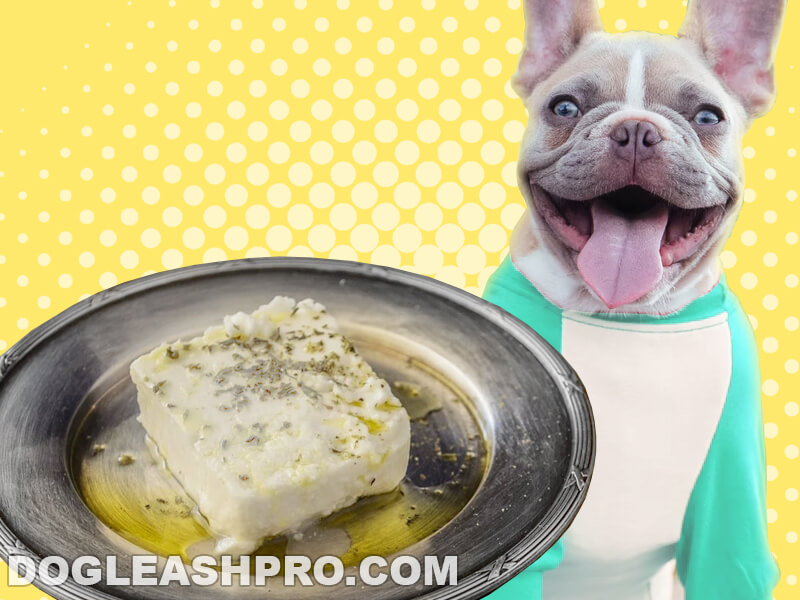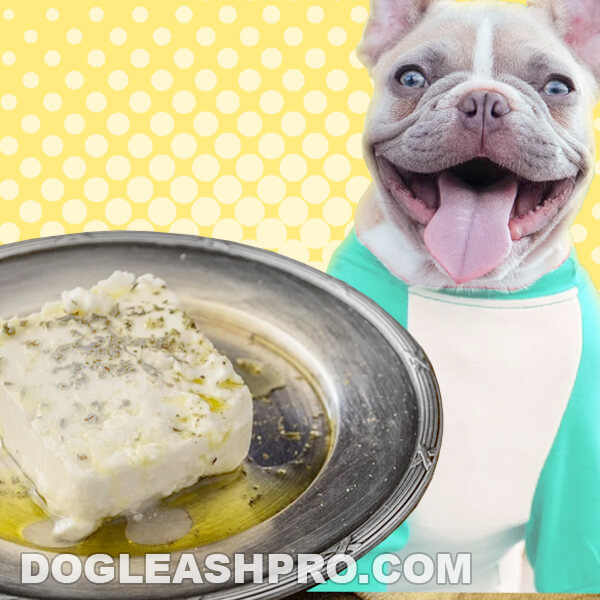
If you would like to treat your dogs to a cheese snack, is Feta Cheese a good choice? While we enjoy adding a bit of Feta Cheese to our salads, is it safe to share Feta Cheese with our furry family members? We’ll discuss both the good and the bad about Feta Cheese. For now, here’s the short answer.
Can dogs eat Feta Cheese? No, dogs should not eat Feta Cheese. Although Feta Cheese isn’t toxic to dogs, it is high in fats and sodium, both of which are harmful to dogs. If your dogs are lactose intolerant, it’s best not to feed them Feta Cheese.
Table of Contents
Can dogs have Feta Cheese?

To err on the side of safety, it’s best that owners don’t feed their canine friends Feta Cheese. There are many reasons to skip Feta Cheese if you’re thinking about sharing it with your furry pals. Before we get to these reasons, let’s find out what Feta Cheese is.
What is Feta Cheese?
Feta Cheese is different from other types of cheeses. Compare to other types of cheese, Feta Cheese is softer and made from either sheep’s milk or a combination of both goat and sheep’s milk.
Feta Cheese has a unique tangy taste that can range from mild to sharp, depending on how long it’s aged in brine.
Feta Cheese contain lactose which is harmful to lactose-intolerant dogs
That’s because there is lactose content in Feta Cheese. Compared to other types of cheeses, Feta Cheese is not high in lactose.
In fact, in one serving size of 125 grams of Feta Cheese, there are only 0.13 grams of lactose content per serving. This is considered low lactose content.
While it is still low in lactose content, adult dogs are generally lactose intolerant and have a hard time digesting dairy products. That’s because they lack an enzyme called lactase that’s responsible for digesting lactose, which is the sugar found in milk.
If you know your four-legged friends are lactose-intolerant or are not able to properly digest dairy products, it’s best to avoid feeding them Feta Cheese.
You might also like: Can Dogs Eat Sour Cream?
High fat content in Feta Cheese puts dogs at risk for canine obesity
Feta Cheese is also high in fat. In just 1 ounce or 28.4 grams of Feta Cheese, there are 6 grams of fat. More than half of this total fat is saturated fat, which is not good for dogs.
If dogs eat Feta Cheese regularly, they are at risk of gaining weight which puts them at risk for health problems like obesity and arthritis.
Feta Cheese is high in salt which can cause salt poisoning in dogs
In just ¼ cup or 28 grams of Feta Cheese, there is 330 mg of sodium. This is way too much salt for our furry friends and they do not need this much salt in their daily diet.
In fact, our K9 pals should only have about 0.25 to 1.5 grams of salt for every 100 grams of the food.
If your pooch accidentally ate ¼ cup of Feta Cheese, then they would have ingested 0.33 grams of salt.
Keep in mind that your dogs’ regular diet would already contain the necessary amount of sodium they need for that day and on top of that, they would be adding 0.33 grams of salt into their existing salt intake.
This can cause salt poisoning in dogs. Signs and symptoms of sodium ion poisoning include the following:
- Loss of appetite.
- Becoming very thirsty causes dogs to drink a lot.
- Urinating more than before.
- Confusion.
- Lack of coordination.
- Muscle tremors.
- Convulsions.
- Muscle and body weakness.
- Diarrhea.
- Vomiting.
- Lethargy.
Fun Fact: Many people enjoy sprinkling some Feta Cheese on mashed potatoes, but is mashed potatoes safe for doggy consumption? Check out Can Dogs Eat Mashed Potatoes? to find out!
Is Feta Cheese bad for dogs?

Feta Cheese is not toxic or poisonous to dogs. If your canine friends ingested a little bit of Feta Cheese, they should be fine. However, it’s very easy to eat a lot of Feta Cheese.
If you have to, you can give your pooch a tiny amount of the Feta Cheese and see how he or she reacts to it. If your furry pooch has a negative reaction to it such that he is passing a lot of gas, having diarrhea, or vomiting, then it’s best to avoid giving him anymore Feta Cheese.
These symptoms indicate that your furry pals are lactose intolerant.
Feta Cheese is bad for dogs in the sense that it has high sodium and fat content. This is why owners should only give their pooch a tiny amount and as a rare occasional treat.
Make sure your pooch doesn’t overeat Feta Cheese and doesn’t eat it daily.
Feta Cheese can be bad for dogs if you add spices or seasonings onto it before feeding it to your four-legged friends. Spices like onion and garlic are toxic to dogs. It’s important that your dogs steer clear of both onion and garlic.
Since Feta Cheese is already salty, avoid adding more salt to it if you plan to give a tiny piece to your pooch.
Is Feta Cheese good for dogs?
Yes, Feta Cheese can be good for dogs since it is packed full of nutrients such as protein and calcium. In fact, in ¼ cup or 28 grams of Feta Cheese, there are 5 grams of protein and 70mg of calcium.
However, owners still need to make sure they are not giving their furry family members too much Feta Cheese or their dogs will experience flatulence.
Before you feed your K9 friends Feta Cheese, make sure they are not lactose intolerant. Consult your vet to find out if your dogs have any allergies if you’re not sure.
So, can dogs eat Feta Cheese?
Although Feta Cheese is not poisonous or toxic to dogs, it’s always best to err on the side of caution and feed your canine friends a tiny amount if you have to. Feta Cheese does have high sodium and fat content so it’s best not to share this soft cheese with your pooch.
Especially if your furry friends are lactose intolerant, avoid giving them Feta Cheese. Otherwise, they may experience diarrhea, bloating, and gas.
DISCLAIMER: THIS WEBSITE DOES NOT PROVIDE MEDICAL ADVICE
The information, including but not limited to, text, graphics, images and other material contained on this website are for informational purposes only. No material on this site is intended to be a substitute for professional veterinary advice, diagnosis, or treatment. Always seek the advice of your veterinarian or other qualified health care provider with any questions you may have regarding dietary needs.
Resources:
https://en.wikipedia.org/wiki/Feta
https://www.wikihow.com/Make-Feta-Cheese

With over five years of specialized experience as an animal writer, my expertise lies in dog nutrition, health, behavior, grooming, and training. I am dedicated to delivering helpful and informative content that caters to the well-being of our furry friends. My primary goal is to empower pet owners with knowledge and ensure our canine companions thrive in health and happiness. In my free time, I love volunteering at local dog rescue centers.







